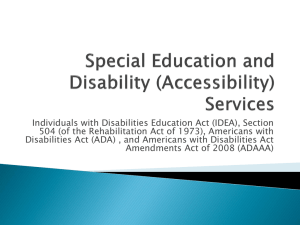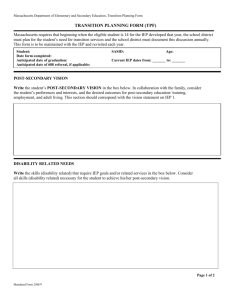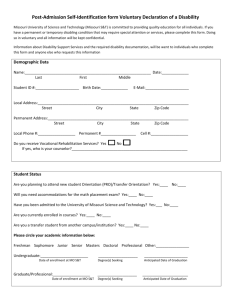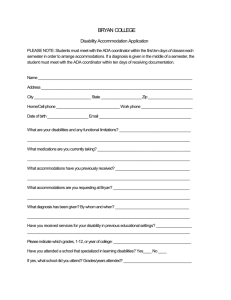Tips for Parents on Post Secondary School
advertisement
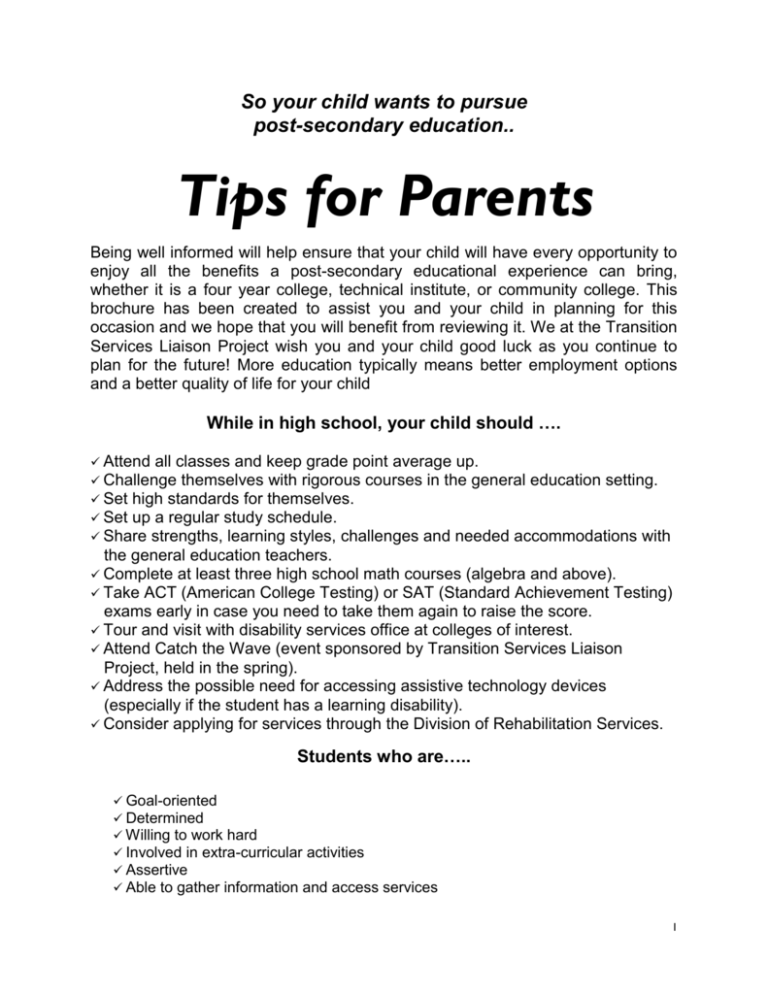
So your child wants to pursue post-secondary education.. Tips for Parents Being well informed will help ensure that your child will have every opportunity to enjoy all the benefits a post-secondary educational experience can bring, whether it is a four year college, technical institute, or community college. This brochure has been created to assist you and your child in planning for this occasion and we hope that you will benefit from reviewing it. We at the Transition Services Liaison Project wish you and your child good luck as you continue to plan for the future! More education typically means better employment options and a better quality of life for your child While in high school, your child should …. Attend all classes and keep grade point average up. Challenge themselves with rigorous courses in the general education setting. Set Set high standards for themselves. up a regular study schedule. Share strengths, learning styles, challenges and needed accommodations with the general education teachers. Complete at least three high school math courses (algebra and above). Take ACT (American College Testing) or SAT (Standard Achievement Testing) exams early in case you need to take them again to raise the score. Tour and visit with disability services office at colleges of interest. Attend Catch the Wave (event sponsored by Transition Services Liaison Project, held in the spring). Address the possible need for accessing assistive technology devices (especially if the student has a learning disability). Consider applying for services through the Division of Rehabilitation Services. Students who are….. Goal-oriented Determined Willing to work hard Involved in extra-curricular activities Assertive Able to gather information and access services 1 Self-aware & self-accepting Able to manage time Prepared in academics stay in post-secondary education! Disability services coordinators at South Dakota post-secondary institutions want parents to know... Disability Coordinators are available to assist students with needed services, but the student must take the initiative to make the request. Students can request accommodations for the ACT test. Students need to understand what their disability is and be able to self advocate. Due to FERPA regulations, college staff can’t give out information to parents, unless the student signs a release. While in high school, students should be ‘weaned away’ from modifications. Modifications alter the content of a course or what is learned or tested, whereas, accommodations do not change the content but only change how content is learned or tested. Accommodations are provided at post-secondary level, not modifications! Post-secondary disability coordinators are not substitute mothers! They will not call students to get them to class or remind them of homework. A student with a disability must meet the standards of the classes they take at a post-secondary institution. Standards are not lowered for students with disabilities. Self-identification and asking for assistance early can prevent failed grades, loss of financial aid and low self-esteem! It should be the student’s choice to pursue further education - not the parent’s! Many of the training programs offered through SD’s technical institutes have admissions and performance expectations that are very similar to those at four-year colleges. Evaluations from high school need to be current (within 3 years) for services at post-secondary institutions. By their freshman year, students should match their course work to the requirements at the post-secondary institution (college or technical institute) they are planning to attend. Students should continue with upper-level math courses during their senior year. That way they come to college with math ‘fresh’ in their mind. College is not always four years. More students are taking longer to get their 2 degrees. Smaller course loads are recommended for some students with disabilities. When leaving the high school environment, students should have experience in using personal assistive technology devices (if needed). To find more information on assistive technology, go to: http://www.dakotalink.tie.net/content/default.htm Post-secondary educational institutes in South Dakota are committed to providing assistance and accommodations for qualified students with specific disabilities or needs. Colleges and technical institutes receiving federal funds must designate a person to help students with disabilities to access accommodations. This person may be known as a 504 Coordinator, disability coordinator, or may have some other title. The disability coordinator is a KEY player in helping students with disabilities be successful in pursuing their postsecondary education goal. For a list of disability coordinators at SD postsecondary institutions, refer to Catch the Wave, a booklet developed by the Transition Services Liaison Project, available at www.tslp.org The Power of Self-Advocacy Self-advocacy is the art of speaking up for yourself and your needs and being able to explain a disability clearly and concisely. Once your child understands his/her disability, the next step is to know what actions or things are needed to be successful. No one at a college or technical institute can, or will, seek your child out because they think that your child may have a disability. Students with disabilities at the post-secondary level need to be able to self-identify and request accommodations. The skill of being able to explain your disability and to speak up for what you need and deserve is of the utmost importance to your child in being successful in the post-secondary education setting! Your child needs to be empowered to be able to discuss his/her disability and accommodations so he/she can meet with the disability services coordinator at the chosen college, prior to attending. Many post-secondary disability coordinators have worked with students who show up for the first time to request accommodations when it may be too late to save their grades. Students then may have to re-take the course (and pay again)! Encourage your Child to Attend Catch the Wave Catch The Wave is a one-day conference designed specifically for high school students who have a disability and are considering post-secondary education (either college or technical institutes). Catch the Wave is typically held in various locations in the spring. Students will learn about preparing for college life, securing appropriate accommodations, and developing self-advocacy and 3 communication skills. Highlights of the conference will be panel discussions with individuals who have a disability and have experienced a post-secondary setting, as well as disability coordinators discussing entrance and eligibility requirements. For more information on the date and location, contact the transition liaison in your area or go to the TSLP website at: www.tslp.org At the post-secondary level, did you know? Students are responsible for revealing their disability and for obtaining disability services. Students typically need to study at least 2-3 hours outside of class for each hour in class. Assignments and tests can not be shortened or altered as they might have been in high school. Open book and/or open notes tests are not available as an accommodation! Students are required to monitor their own progress and communicate their needs to their instructors. Students must manage their own time and schedules. Attendance policies may vary with each instructor. (Hint: lack of attendance may impact performance!) Classes may have 100 students or more. Students are responsible to check with their instructors to see if they are meeting requirements of the class. Instructors are usually open and helpful, but expect students to initiate contact when assistance is needed. Instructors expect students to get information from a fellow classmate when they miss a class. Tests are usually infrequent (2-3 times a semester), may be cumulative and cover large amounts of material. Tests and major papers provide the majority of the grade in a course. Generally speaking, extra credit options are not used to raise a grade. Students are responsible for setting their own priorities. Most classes require a LOT of out-of-class reading time. There are a variety of services that Division of Rehabilitation Services (DRS) can offer to students who are planning to pursue post-secondary education.If your child hasn’t applied for these services while in high school, have them do so immediately. Some services DRS may provide (based on eligibility and individual needs) are: 4 guidance in transition planning; financial assistance for college or training, when appropriate; vocational counseling; transportation, equipment and other services if needed for training; and assessing for assistive technology equipment and services. For information on the address and phone number of the DRS office nearest you, go to http://dhs.sd.gov/drs/ or call (605) 773-3195. Final Thoughts . . . . . . . is essential - you and your child’s IEP team need to begin the transition to post-secondary education early! College students with disabilities must be given an equal opportunity to benefit from the program (an opportunity comparable to that afforded nondisabled students), however; The law ensures opportunity; it doesn’t ensure success. Successful college students take primary responsibility for accommodations, communication and services. Assistance is available IF students ask for it! Communication 5



